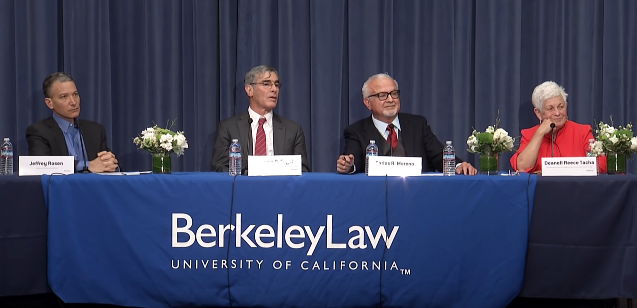California Lawyers Association
Judges Discuss Their Values, Challenges

What’s the most important quality that Gov. Gavin Newsom is looking for in making his judicial appointments?
According to former California Supreme Court Justice Carlos Moreno – who got the tidbit directly from Judicial Appointments Secretary Martin Jenkins – that quality is humility.
“I think that’s very telling…. We’re all human. We all have to be humble. You have to recognize where you came from, where you are and your obligation to do justice,” Moreno said at a June 19 program, “The Human Side of Judging,” sponsored by the National Constitution Center and the Berkeley Judicial Institute at Berkeley Law School.
Moreno joined a panel of current and former judges in a candid discussion of how judges handle the personal struggles that their role often entails such as chronic stress and public pressure amplified by social media. The full 90-minute program is available to watch online.
The rise of social media has created both angst and opportunities for judges.
On the one hand, Justice Eva Guzman of the Supreme Court of Texas, a regular on Twitter (@JusticeGuzman), said the medium gives the public insight into the judicial branch at a time when public confidence may be at an all-time low.
But it also amplifies the public outrage when judges make unpopular decisions that they maintain are based on the law and facts.
Former U.S. District Court Judge Jeremy Fogel shared how he was traumatized by the visceral public reaction to his handling of litigation over California’s death penalty protocols. The public didn’t seem to understand that the case wasn’t about the underlying horrific murder, the guilt of the defendant or the propriety of the death penalty.
“I’m so grateful it happened before anyone had heard of social media. Today, there would have been millions of responses. There would have been death threats,” he said.
Judge Charles R. Breyer of the U.S. District Court for the Northern District of California said he avoids social media but favors cameras in the courtroom to educate the public about the judicial system.
“My greatest concern is the judiciary has become polarized,” he said. “It’s very dangerous for the court to appear to take partisan decisions. I know my colleagues. My colleagues will not do that. They will try to call them as they see them.”
That doesn’t mean he and other judges don’t think about the real-life consequences – they just can’t let that guide their decision-making. Sentencing decisions, in particular, Breyer finds difficult because, he said, “there is no right answer.”
Guzman said one of the most common misperceptions about the judiciary is that judge’s minds are made up ahead of time and that every court decision is absolutely right or wrong.
“The conversations are more nuanced than that,” she said. “By and large the majority of judges want to get to the right answer the public doesn’t always see it that way.”
“We need to do a better job of explaining what we’re doing and why we’re doing it,” Fogel said.
Deanell Reece Tacha, former Chief Judge of the U.S. Court of Appeals for the Tenth Circuit and former Dean of Pepperdine Law School, said she’s concerned some judges are reluctant to get involved in organizations outside the court in the name of impartiality.
“The most important thing for a judge to do is to stay in contact with the community,” she said, through nonpartisan groups such as 4-H, a homeless shelter or a philanthropic board.
“We have got to be identified with our communities along with our courts,” she said.
